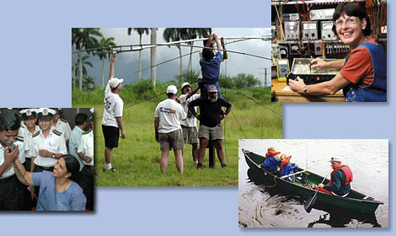Broadband over power line's ham radio problem- and vice versa


We hear lots of praise of how Broadband over Power Line (BPL) technology holds promise as a route for signals into the home that can get around the cable-telecom duopoly. And how BPL can also be a conduit for broadband in rural areas that are too far from switching offices for DSL to work right, and haven't been wired up for broadband cable.
Like so many other magic bullets, though, this solution proves too good to be true much of the time.
Fascinating story from the AP's Peter Svensson about how Broadband over Power Line (BPL) technology can interfere with ham radio transmissions.
Turns out the problem is especially acute in rural areas, where power lines are almost exclusively abvove ground.
According to the American Radio Relay League, (to whom the pix at top of this post should be credited) the problem is that radio waves emitted by the power line can drown out amateur radio signals within a quarter of a mile. What's more, a power line signal can run astray even after short distances, requiring amplifiers to keep up signal integrity. This tends to re-create the interference problems.
The issues are by no means restricted to rural areas, though.
George Tamovsky, a ham radio enthusiast in booming Manassas, Va., says that interference from BPL has just about ruined his hobby. He talks of being on his ham radio, driving around, and then hearing "incredible signal(s)" that sound like rapid clicks or the whine of a phone-line modem.
For Tamovsky, these interruptions are far more than just a hobbyist's version of a techno party-pooper. He tells Svensson that such interference threatens the communications services that mobile ham radio operators can offer during disasters, such as Hurricane Katrina.
Various new BPL technologies such as Motorola's approach of using only short transformer-to-home routing may mollify the ham radio folks, but only partially. The American Radio Relay League would like tougher FCC regulations against interference from BPL.
I see both sides. I built a ham radio when I was a kid (still am a kid at heart)- and now I write about the broadband wars. But that's just me. What do you think?